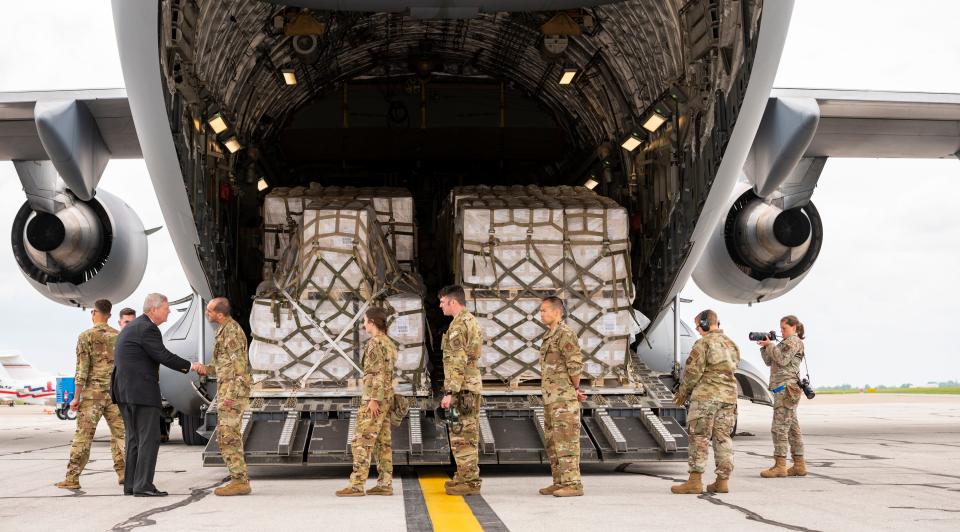Fulfilling 'critical need,' military plane delivers infant formula from Europe to US
INDIANAPOLIS - Since February, Amanda Foster-Moudy has had a progressively harder time finding formula for her 8-month-old, Leo.
She’s joined online groups where mothers share tips and photos of where to find the precious nutrition for their babies and share excess product. Sometimes, she said, her husband Dave Moudy has spent two to three hours driving around to different stores, only to find empty shelves.
“He’s my runner,” she said. “If he can’t find it, he goes to another place. Then another place, then another place.”
On Sunday, the Moudys and young Leo watched with delight as a C-17 military plane with a belly full of formula produced in Europe landed at Indianapolis International Airport – the first shipment to hit the United States as part of President Joe Biden’s recently announced Operation Fly Formula initiative.
MAKING MORE FORMULA: Biden invokes Defense Production Act to boost baby formula production
Importing formula from Europe would typically take about two weeks under the normal commercial process, said U.S. Department of Agriculture Secretary Tom Vilsack, speaking at the airport as the shipment was unloaded and packed on to FedEx trucks that delivered it to a Nestlé distribution plant just a few miles away.
But last week, Biden announced a special protocol to expedite the process with an eye toward easing the shortage.
“The reason we are doing this is obviously the critical need that is out there,” Vilsack said. “We’re going to get this here in a matter of days, and a matter of days means a lot to the moms and dads who are worried.”
The C-17 that landed Sunday in Indianapolis contained 132 pallets of Nestlé formula specially designed for infants and toddlers with cow milk allergies. That amounts to about 78,000 pounds – enough to feed 9,000 babies and 18,000 toddlers for a week.
The formula was made in Nestlé’s Zurich plant and trucked to Ramstein Air Base in Germany, where a crew that had just completed an aid delivery to Ukraine brought it to the U.S.
The formula could benefit infants like 7-month-old Ensley Gendig, who has a dairy and soy allergy that makes finding the right formula challenging for parents Megan and Steven.
Ensley has had a mix of breast milk and formula, but keeping the formula on hand has not been easy for her parents. Both members of the Bargersville couple travel around central Indiana for their jobs and look for formula around the region.
“This means a lot not only for our little one, but also for so many others that are really banking on this to help provide meals for their kids,” Megan Gendig said.

Some cases would be ready for distribution in a few days, Nestlé officials said. The rest are still awaiting results of standard quality testing performed in Switzerland. Those will be distributed once the results come back.
Another shipment of 112 pallets of a broader range of baby formula from Europe is expected to arrive in the Washington, D.C., area, in the coming days, Vilsack said. The Indianapolis shipment will go to hospitals and health clinics around the country.
The formula that arrived Sunday will help some of those hardest hit by the formula shortage, said Dr. Emily Webber, a pediatrician and Riley Hospital for Children’s chief medical information officer.
About 70,000 children in the U.S. are allergic to cow milk, Vilsack said.
“Depending on the special formulas and for most intensely the children that need these formulas, there aren’t any substitutions,” Webber said. “There aren’t any shortcuts.”
Brian Deese director of the National Economic Council, told CNN on Sunday that the formula from Europe would provide "some incremental relief in the coming days."
He said on CNN's "State of the Union" that more help was coming.
"We're going to keep working on it over the course of the week," he said.
Asked how the situation reached the point that a first-world country would run out of infant formula, Deese pointed to the shutdown of manufacturer Abbott's factory, and questioned why there wasn't more competition in the market.
"It goes back to this question of how we can bring more competition in our economy, have more providers of this formula so that no individual company has this much control over supply chains," he said.
How the formula crisis began

The crisis has been brewing since February, when an Abbott plant in Sturgis, Michigan, shut down after four infants who drank formula produced there developed bacterial infections. Last week, the Food and Drug Administration and Abbott reached a deal to reopen the plant.
Abbott Nutrition officials have said that it could take up to two weeks to open the plant, and then another six to eight before product hits store shelves.
To help Abbott ramp up production, Biden last week triggered the Defense Production Act, which will give the plant priority for necessary supplies, including formula ingredients, container lids and paper for labeling.
In addition, the government is discussing getting additional formula from other countries such as Australia, Vilsack said. Although the United States imports a small amount of baby formula from Mexico, the Netherlands, and Ireland, typically about 98% of the product consumed here is produced here.
“Certainly within the next 30 days, we’re going to begin seeing abatement of this situation,” Vilsack said. “Over the course of the next several weeks, we should see an ever-increasing supply.”
Contributing: Merdie Nzanga
Contact IndyStar reporter Shari Rudavsky at shari.rudavsky@indystar.com. Follow her on Facebook and on Twitter: @srudavsky.
This article originally appeared on Indianapolis Star: Baby formula flown from Europe to US to help ease shortage

 Yahoo Movies
Yahoo Movies 
